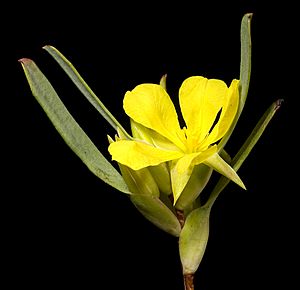Hibbertia subvaginata facts for kids
Quick facts for kids Hibbertia subvaginata |
|
|---|---|
 |
|
| Scientific classification |
|
| Kingdom: | Plantae |
| Clade: | Tracheophytes |
| Clade: | Angiosperms |
| Clade: | Eudicots |
| Order: | Dilleniales |
| Family: | Dilleniaceae |
| Genus: | Hibbertia |
| Species: |
H. subvaginata
|
| Binomial name | |
| Hibbertia subvaginata (Steud.) F.Muell.
|
|
| Script error: The function "autoWithCaption" does not exist. | |
| Synonyms | |
|
Candollea subvaginata Steud. |
|
Script error: No such module "Check for conflicting parameters".
Hibbertia subvaginata is a small shrub that grows only in Western Australia. It's a type of plant that belongs to the Hibbertia family, known for its bright yellow flowers.
What it Looks Like
Hibbertia subvaginata is usually an upright bush, but sometimes it spreads out. It can grow from about 15 centimeters (6 inches) to 1.2 meters (4 feet) tall. You can spot its bright yellow flowers from July to December, which is winter and spring in Australia.
Where it Grows
This plant is found in several areas of Western Australia. These include the Avon Wheatbelt, Esperance Plains, the Geraldton Sandplains, the Jarrah Forest, the Swan Coastal Plain, and Warren. It likes to grow in sandy soil, on granite rocks, or in laterite (a type of reddish soil). You can find it on sandplains, sand dunes, floodplains, and rocky outcrops.
Naming the Plant
This plant was first described and given a name by a scientist named Steudel in 1845. He called it Candollea subvaginata. Later, in 1880, another scientist named Ferdinand von Mueller moved it to the Hibbertia group of plants.
The second part of its name, subvaginata, comes from Latin words. "Sub-" means "somewhat" or "not completely", and "vaginata" means "sheathed". So, subvaginata means "somewhat sheathed". This name describes how the plant's flowers look.
 | Claudette Colvin |
 | Myrlie Evers-Williams |
 | Alberta Odell Jones |

